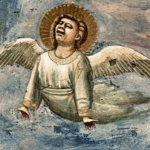After the mass shooting in a Colorado grocery store a few weeks ago, a woman on Twitter posted this:
I’ve got to go to the grocery store today. The store has 1 front entrance, & 1 exit out the back. If a shooter came in, I might not be able to escape, & I’m scared to go. Does this mean I need therapy? Or am I an American accepting the reality of mass shootings?
Several hundred people responded, the vast majority of whom assured her that she does not need therapy. I agreed, but I believe there are more possibilities than the two she proposed. I responded:
We need serious gun reform legislation. And don’t live in fear.
A couple of years ago, I was interviewed on a podcast by a young man who asked me, at the end of a lively hour-long conversation, what advice I might have for a person going through a crisis of faith (he called it a “deconstruction” of faith), a person for whom all of the reliable answers, formulas, and guidelines are no longer working. What is my best advice for a person face to face with uncertainty and doubt in areas that have been, up to that point in their life, the most constant sources of certainty and confidence? After a few moments of consideration, I said: “Don’t be afraid.” Easier said than done.
This morning’s lectionary readings include perhaps the best known line from First John: “Perfect love casts out fear.” There might not be a better one-sentence summary of the heart of the Christian faith. But in the version of Christianity I was raised in, although we used the word “love” a lot, it seemed to me that fear was the primary motivator. God was someone to be afraid of. So were people who didn’t believe and worship as we did. Atheists, the godless Communists, liberal Hollywood, forgetting to witness regularly to everyone you encountered—these were just a few of the things we were afraid of.
Perfect love casts out fear? We knew it had to be true, because it is in the Bible. But what might that actually look like? We had no idea. Fear is a primary motivator of human behavior, and almost always directs us toward thoughts and actions that are damaging and destructive. And one of the greatest sources of human fear is change. The first thing that an angel says in Scripture when showing up to an unsuspecting human being is almost always “Fear not.” And for good reason.

Despite the sanitized versions of angels to be found in art and commerce, the appearance of an angel in Scripture is almost always a harbinger of change, an indication that your world is never going to be the same again. Angels never show up simply to announce that “everything’s fine and you’re on the right track.” Angels are always the heralds of new beginnings, inviting us to adventure. They introduce mystery—they do not clarify. Angels announce new departures and the beginning of something whose end is not in view. And the first thing the angel says is that we don’t need to be afraid of change and disruption.
The problem is that human beings don’t like change. Admit it—no matter how liberal, progressive, open-ended or cutting-edge you think you are, you prefer security and stability to change. As William James wrote, “in the matter of belief, we are all extreme conservatives.” We don’t want our most fundamental and cherished beliefs to be challenged or disrupted. One of the most important aspects of what I do for a living involves regularly challenging my students’ assumptions and most entrenched beliefs—many of which are subconscious and many of which they adopted from their parents and other authorities unquestioningly as children and adolescents. The challenge is intended not primarily to change those beliefs, but rather to reveal them and then to equip students to evaluate them intelligently and consciously.
One of the best pieces of advice I ever received as an inexperienced teacher decades ago comes from Vera Brittain’s Testament of Youth.
There is still, I think, not enough recognition by teachers of the fact that the desire to think–which is fundamentally a moral problem–must be awakened before learning can occur. Most people wish above all else to be comfortable, and thought is a pre-eminently uncomfortable process.
Brittain’s insight is as relevant to the process of faith and belief as to what happens in the classroom. Because the stakes are so high, there is arguably no arena in which we desire certainty in our beliefs more than when considering what is greater than us and our relationship to it. Persons of faith tend to treat their religious convictions as if they are inviolably certain; I have encountered many atheists who are just as certain in their non-theistic beliefs as the most dedicated fundamentalist persons of faith are in theirs.
And yet there is no area of belief in which we have less reason to be certain about anything than when considering what is greater than us. As one of my most beloved philosophical influences, Michel de Montaigne, writes in his Essays,
What is more vain than to want to guess at God by our analogies and conjectures, to regulate him and the world according to our capacity and our laws, and to make use at the expense of divinity of that small sample of sufficiency it has pleased him to dispense to our natural condition? And because we cannot extend our vision as far as his glorious throne, are we to bring it down here to our corruption and to our wretchedness?
The answers to these questions seem obvious—restricting the divine to our limited capacities is indeed vain, and no, we should not seek to drag the divine down to be confined within our limitations. Yet, Montaigne reminds us, this is precisely what we do.
We prescribe limits for him; we besiege his power with our arguments . . . we want to enslave God to the vain and feeble appearances of our understanding, he who has made both us and our knowledge . . . What! Has God put into our hands the keys and the last resorts of his power? Is he obliged not to exceed the limits of our knowledge?
This is why we need not be afraid when what we were taught concerning the nature and preferences of God turns out to be incomplete, flawed, or simply wrong. We need not be afraid when our current “best hypothesis” concerning human/divine relationships turn out to be inadequate to current experience. What else would we expect? Uncertainty, doubt, trial-and-error, incremental advance and retreat—these are part and parcel of being human. To be afraid of change, to be afraid of being wrong—these are to be afraid of being human.












